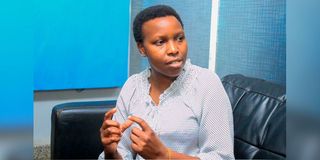Financial expert: Why it's important to have a savings plan

Financial advisor Irene Kibire gestures during an interview at Nation Centre in Nairobi on December 18, 2023.
What you need to know:
- Irene Kibire recommends putting at least 20 per cent of one's income into a savings plan.
- According to Kibire, the earlier ones starts saving, the higher their chances of having high returns.
While serving as a lecturer at the university, Irene Kibire conducted various forms of research that led her to identify a huge gap in terms of the knowledge that people have about money.
Based on her findings, many people only knew of money as a medium of exchange. They however were not aware about other elements related to money, such as why it is important to have a savings plan, or why it is important to invest.
“When you mention saving for instance, most people will assume that putting money in a deposit bank or a safe is a good enough form of saving. That is not the case. A good savings plan is when you put your money in a vehicle that earns you some form of return,” Kibire said during an interview with Nation.Africa.
To create more awareness around financial literacy, Kibire opted to switch careers to become a financial consultant. She stopped working at the university to pursue an insurance and financial management course at the College of Insurance.
Upon completing her studies, she received a license that would allow her to provide clients with various forms of financial advice, including some of the best savings plans to pursue.
Insurance provider
“There are different types of savings plans. For instance, you can choose to save on insurance. This is where you put some money aside for the future with an insurance provider, who will also give you a risk cover over unforeseen events,” Kibire said.
Such a cover can benefit a person’s dependents, in case something unfortunate such as death, a disability or a critical illness happens to them, especially if they happened to be the sole breadwinner.
“Assuming you have children who are going to school and they need school fees maybe in the next 10 years, and you pass on during the third or fourth year, the insurance comes in, takes over that risk, they pay for you until maturity and give your dependents the money when they need it,” Kibire explained.

Financial advisor Irene Kibire gestures during an interview at Nation Centre in Nairobi on December 18, 2023.
While one's dependents will still grieve upon their demise, at least the dependents will be better off, compared to if the breadwinner had not taken up a plan.
The other advantage of such a plan is that regardless of whether one is alive or not, as long as they have put aside a certain amount at the end of every month, within a certain period, usually 4 years, they qualify to receive a lump sum payout from the insurer.
“You buy something in insurance called annuity which means a guaranteed payout for the rest of your life, but if you do not have any savings, when you get to 60, what do you have, maybe you resort to borrowing, or depending on your children. These are some of the things that lead to depression,” she said.
Saving early
Kibire, who also works at Britam Holdings as a financial advisor, recommends putting at least 20 per cent of one's income into a savings plan, regardless of how much one earns, and which sector of the economy they operate in.
“The rule is 50-30-20. In essence, 50 per cent of your earnings should go towards bills and expenses, 30 per cent should go towards your wants, while 20 per cent should go towards savings. If you become disciplined on that 20 per cent, for the next several years, your retirement is guaranteed,” she explained.
Kibire also recommends starting saving early. The earlier one starts, the higher their chances of having high returns. At the same time, their risk profile is lower from the insurance point of view, therefore they will pay a lower premium. An older person, on the other hand, has a higher risk profile, therefore they will pay a higher premium, and the returns will be lower.
“Let us say someone starts at 20 and retires at 60, you have 40 years in between. Someone else starts at 40 and the retirement age is 60, they have 20 years. If they were to save Sh20,000 each every month, you cannot compare the one who has been saving for 20 years with the one who has been saving for 40 years,” notes Kibire.
At 2.43 per cent, Kenya has the third lowest insurance penetration rate in sub-Saharan Africa. The low penetration rate can be attributed to several factors, including lack of information and a perception that insurance is not an essential product.





